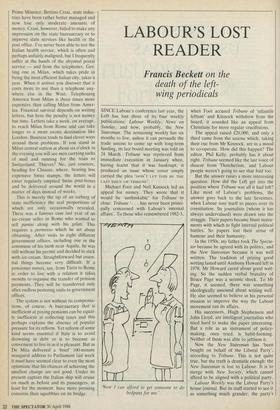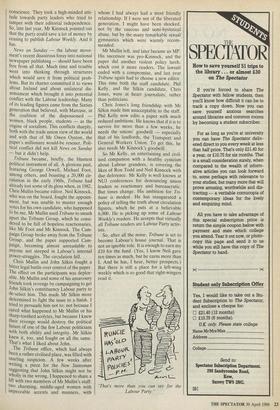LABOUR'S LOST READER
Francis Beckett on the death of the left- wing periodicals SINCE Labour's conference last year, the Left has lost three of its four weekly publications: Labour Weekly, News on Sunday, and now, probably, the New Statesman. The remaining weekly has six months to live, unless it can persuade the trade unions to come up with long-term funding, its last board meeting was told on 24 March. Tribune was reprieved from immediate execution in January when, having learnt that it was bankrupt, it produced an issue whose cover simply carried the plea 'DON'T LET This BE TILE LAST ISSUE OF TRIBUNE'.
Michael Foot and Neil Kinnock led an appeal for money. They wrote that it would be 'unthinkable' for Tribune to close: Tribune '. . . has never been princi- pally concerned with Labour's internal affairs'. To those who remembered 1982-3,
Now I can afford to get someone to do bedpans for me.'
when Foot accused Tribune of 'infantile leftism' and Kinnock withdrew from the board, it sounded like an appeal from Christians for more regular crucifixions.
The appeal raised £20,000, and only a third came from the unions which, taking their cue from Mr Kinnock, are in a mood to co-operate. How did this happen? The editor, Phil Kelly, probably has it about right. Tribune seemed like the last voice of dissent from Thatcherism, and Labour people weren't going to see that fold too.
But the answer raises a more interesting question. How did the Left get into the position where Tribune was all it had left? Like most of Labour's problems, the answer goes back to the late Seventies, when Labour tore itself to pieces over its constitution. Its journalists (whom it has always undervalued) were drawn into the struggle. Their papers became blunt instru- ments with which to fight internal political battles. So papers lost their sense of humour and their humanity.
In the 1950s, my father took The Specta- tor because he agreed with its politics, and the New Statesman because it was well written. The tradition of prizing good writing lasted until Anthony Howard left in 1978. Mr Howard cared about good writ- ing. So the sudden verbal brutality of Bruce Page was a seismic shock. To Mr Page, it seemed, there was something ideologically unsound about writing well. He also seemed to believe in his personal mission to improve the way the Labour movement ran its affairs.
His successors, Hugh Stephenson and John Lloyd, are intelligent journalists who tried hard to make the paper interesting. But a role as an instrument of policy- making, once tried, is habit-forming. Neither of them was able to jettison it.
Now the New Statesman has 'been bought on behalf of the Liberal Party', according to Tribune. This is not quite true, but the truth is dramatic enough: the New Statesman is lost to Labour. It is to merge with New Society, which cannot afford to be aligned with a political party.
Labour Weekly was the Labour Party's house journal. But its staff started to see it as something much grander: the party's conscience. They took a high-minded atti- tude towards party leaders who tried to tamper with their editorial independence. So, late last year, Mr Kinnock pointed out that the party could save a lot of money by ceasing to publish Labour Weekly. And it has.
News on Sunday — the labour move- ment's recent disastrous foray into national newspaper publishing — should have been free from all that. Much time and trouble went into thinking through structures which would save it from political prob- lems. But its charter committed it to views about Ireland and about unilateral dis- armament which brought it into potential conflict with the Labour leadership. Many of its leading figures came from the Sixties generation that believed, with Marcuse, in the coalition of the dispossessed — women, black people, students — as the engine of socialism. This conflicts sharply, both with the trade union view of the world and with that of Mr Owen Oyston, the Paper's millionare would-be rescuer. Poli- tical conflict did not kill News on Sunday — but it didn't help.
Tribune became, briefly, the bluntest Political instrument of all. A glorious past, featuring George Orwell, Michael Foot, among others, and boasting a 20,000 cir- culation in the early 1960s, Tribune had already lost some of its gloss when, in 1982, Chris Mullin became editor. Neil Kinnock, Who was on the board, fought the appoint- ment, but was unable to muster enough votes for his own candidate, who happened to be me. Mr Mullin used Tribune to smash apart the Tribune Group, which he consi- dered to be full of hopeless reactionaries, like Mr Foot and Mr Kinnock. The Cam- paign Group broke away from the Tribune Group, and the paper supported Cam- paign, becoming almost unreadable to anyone not steeped in Labour's internal Power-struggles. The circulation fell.
Chris Mullin and John Silkin fought a bitter legal battle over control of the paper. The effect on the participants was deplor- able. Mr Mullin and some of his unsavoury friends took revenge by campaigning to get John Silkin's constituency Labour party to de-select him. This made Mr Silkin more determined to fight the issue to a finish. I tried to persuade him not to: not because I cared what happened to Mr Mullin or his sharp-toothed acolytes, but because I knew their revenge would destroy the political future of one of the few Labour politicians With both ability and integrity. Mr Silkin knew it, too, and fought on all the same. That's what I liked about John.
The Tribune office, which had always been a rather civilised place, was filled with snarling suspicion. A few weeks after writing a piece for the New Statesman suggesting that John Silkin might not be Wholly in the wrong, I happened to share a lift with two members of Mr Mullin's staff: two charming, middle-aged women with impeccable accents and manners, with
whom I had always had a most friendly relationship. If I were not of the liberated generation, I might have been shocked, not by the raucous and semi-hysterical abuse, but by the many remarkable sexual gymnastics which were warmly recom- mended.
Mr Mullin left, and later became an MP. His successor was pro-Kinnock, and the paper did another violent policy lurch, which cost it more readers. The lawsuit ended with a compromise, and last year Tribune again had to choose a new editor. This time both the staff candidate, Phil Kelly, and the Silkin candidate, Chris Jones, were at heart journalists, rather than politicians.
Chris Jones's long friendship with Mr Silkin made him unacceptable to the staff. Phil Kelly now edits a paper with much reduced ambitions. He knows that if it is to survive for more than a few weeks, he needs the unions' goodwill — especially that of his landlords, the Transport and General Workers Union. To get this, he also needs Mr Kinnock's goodwill.
So Mr Kelly, an entertaining and civil- ised companion with a healthy cynicism about Labour grandees, is covering the likes of Ron Todd and Neil Kinnock with due deference. Mr Kelly is well known at NUJ conferences for denouncing union leaders as reactionary and bureaucratic. But times change. His ambition for Tri- bune is modest. He has inaugurated a policy of telling the truth about circulation figures, which he puts at a believable 6,000. He is picking up some of Labour Weekly's readers. He accepts that virtually all Tribune readers are Labour Party activ- ists.
So, after all the noise, Tribune is set to become Labour's house journal. That is not an ignoble role. It is enough to earn my £10 for the fund. (Yes, I know Neil gave ten times as much, but he earns more than I. And he has, I hear, better prospects.) But there is still a place for a left-wing weekly which is so good that right-wingers read it.
'That's more than you can say for the Labour Party.'



























































 Previous page
Previous page